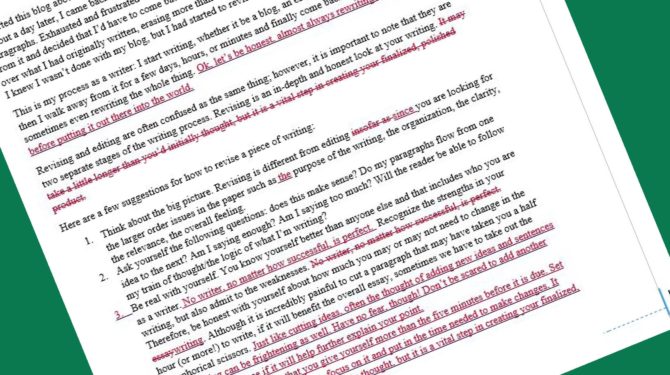4 Tips for Revising Your Writing

~ The Third Step In the Writing Process: Revision ~
I started this blog about two weeks ago, writing down all my ideas and just getting words on the page. About a day later, I came back to it and tried to turn my ideas into complete sentences and flowing paragraphs. Exhausted and frustrated because it wasn’t perfect, I walked away from it and decided that I’d have to come back to it another time. Finally, four days ago, I looked over what I had originally written, erasing more than half of it and adding only about five more sentences.
I knew I wasn’t done with my blog, but I had started to revise.
This is my process as a writer: I start writing, whether it be a blog, an essay, an email, a text message, then I walk away from it for a few days, hours, or minutes and finally come back to it and revise, sometimes even rewriting the whole thing. Ok, let’s be honest, almost always rewriting the whole thing, before putting it out there into the world.
Revising and editing are often confused as the same thing; however, it is important to note that they are two separate stages of the writing process. Revising is an in-depth and honest look at your writing. Here are a few suggestions for how to revise a piece of writing:
- Think about the big picture. Revising is different from editing since you are looking for the larger order issues in the paper such as the purpose of the writing, the organization, the clarity, the relevance, the overall feeling.
- Ask yourself the following questions: does this make sense? Do my paragraphs flow from one idea to the next? Am I saying enough? Am I saying too much? Will the reader be able to follow my train of thought/the logic of what I’m writing?
- Be real with yourself. You know yourself better than anyone else and that includes who you are as a writer. No writer, no matter how successful, is perfect. Recognize the strengths in your writing, but also admit to the weaknesses. Therefore, be honest with yourself about how much you may or may not need to change in the writing. Although it is incredibly painful to cut a paragraph that may have taken you a half hour (or more!) to write, if it will benefit the overall essay, sometimes we have to take out the metaphorical scissors. Just like cutting ideas, often the thought of adding new ideas and sentences to our writing can be frightening as well. Have no fear, though! Don’t be scared to add another paragraph or sentence if it will help further explain your point.
- Put in the time. Make sure that you give yourself more than the five minutes before it is due. Set aside time when you will be able to focus on it and put in the time needed to make changes. It may take a little longer than you’d initially thought, but it is a vital step in creating your finalized, polished product.
# # #
KKrawiec
RELATED READING
The 4 Steps In the Writing Process



